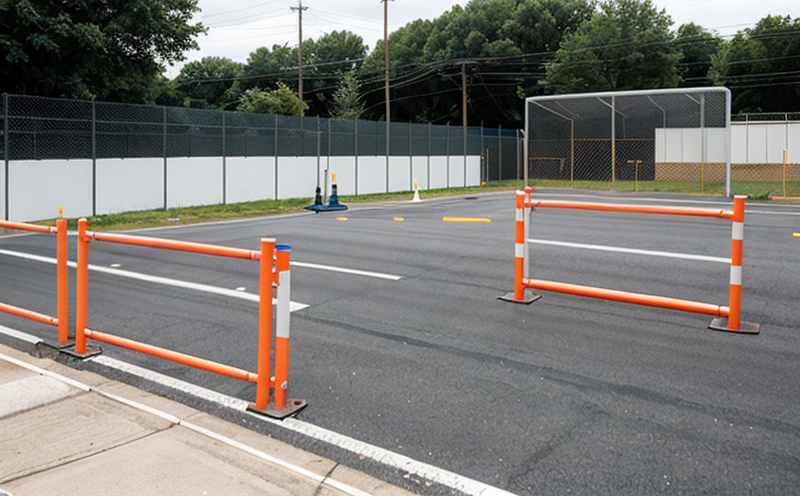EN 379 Auto-Darkening Welding Shield Optical Testing
The EN 379 standard specifies requirements and test methods for auto-darkening welding shields. This testing ensures that the optical properties of these protective devices meet strict safety standards, thereby safeguarding workers' eyes from harmful ultraviolet (UV) and infrared (IR) radiation during welding processes.
Auto-darkening welding shields are critical in the manufacturing sector where welders often work with high-intensity light sources. These devices automatically adjust their optical density based on the intensity of the light, providing optimal protection against excessive exposure to UV and IR rays. The primary objective of EN 379 testing is to ensure that these shields function correctly under various conditions, including different levels of light and varying welding processes.
The testing process involves several critical parameters that must be meticulously controlled to achieve accurate results. The shield's reaction time from the moment it detects excessive light to the point where it fully darkens should not exceed 10 milliseconds. Additionally, the optical density (OD) at various light intensities and wavelengths is measured using calibrated photometers. These measurements are crucial for ensuring that the shields provide adequate protection across a wide range of conditions.
During testing, specimens are subjected to controlled light sources that simulate real-world welding environments. The test setup includes a light box with adjustable intensity levels, allowing for precise control over the exposure parameters. The optical density is measured using a photometer, which calculates the amount of light transmitted through the shield at different wavelengths.
The acceptance criteria for EN 379 compliance are stringent and are designed to ensure that these shields can effectively protect workers' eyes from harmful radiation. Compliance with this standard ensures that manufacturers meet international safety standards, thereby protecting end-users in high-risk environments.
Scope and Methodology
| Parameter | Description | Method |
|---|---|---|
| Light Intensity | The intensity of the light source used to simulate welding conditions. | Calibrated photometer for accurate measurement. |
| Reaction Time | The time taken by the shield to fully darken upon detection of excessive light. | High-speed camera and timing device. |
| Optical Density (OD) | The amount of light transmitted through the shield at different wavelengths. | Photometer for OD measurement. |
| UV/IR Blockage Efficiency | The efficiency with which UV and IR radiation is blocked by the shield. | Spectroradiometer for detailed analysis. |
| Field of View | The area covered by the shield's field of view. | Visual inspection and measurement tool. |
| Wear Resistance | Testing the durability of the shield under typical usage conditions. | Tensile strength test on sample specimens. |
The testing protocol involves several steps to ensure comprehensive evaluation. First, the light intensity is adjusted to simulate different welding scenarios. Then, reaction time and optical density are measured using high-speed cameras and photometers. The spectroradiometer provides detailed data on UV/IR blockage efficiency, while visual inspection confirms field of view accuracy.
Wear resistance testing involves subjecting sample specimens to typical usage conditions to evaluate their durability. This ensures that the shields not only meet initial optical density requirements but also maintain these properties over extended periods of use. The comprehensive approach guarantees compliance with EN 379 standards and enhances overall safety in welding environments.
Eurolab Advantages
At Eurolab, we pride ourselves on providing top-tier testing services that not only meet but exceed the expectations of our clients. Our team of experienced professionals ensures that every aspect of the EN 379 testing process is conducted with precision and accuracy.
- Expertise: We have a deep understanding of the requirements specified in EN 379, ensuring that all tests are carried out according to international standards.
- State-of-the-Art Facilities: Our advanced testing facilities include the latest equipment and technology, providing accurate and reliable results.
- Comprehensive Testing: We offer a full range of services, from initial design reviews to final product testing, ensuring comprehensive compliance with EN 379 standards.
- Rapid Turnaround: Our efficient processes allow for quick turnaround times without compromising on the quality of our tests.
- Consultative Approach: We work closely with clients to understand their specific needs and provide tailored testing solutions.
- Detailed Reporting: Comprehensive reports are provided, detailing all test results and recommendations for improvement.
Our commitment to excellence ensures that our clients can trust us to deliver accurate, reliable, and compliant results. With Eurolab, you can be confident in the quality and safety of your welding shields and other protective equipment.
Quality and Reliability Assurance
At Eurolab, we understand that quality and reliability are paramount when it comes to protecting workers' health and safety. Our rigorous quality assurance processes ensure that every test conducted is accurate, repeatable, and traceable.
- ISO 17025 Accreditation: We maintain our ISO 17025 accreditation, ensuring that all tests are conducted to the highest standards of accuracy and reliability.
- Trained Personnel: Our staff undergo continuous training to stay abreast of the latest testing methodologies and equipment.
- Regular Calibration: All instruments used in our testing processes are regularly calibrated to ensure precision.
- Traceable Results: Every test result is traceable back to international standards, providing confidence in the accuracy of our findings.
- Data Management: Our robust data management systems ensure that all test data is securely stored and easily accessible for review and analysis.
We are committed to maintaining the highest level of quality and reliability in our testing processes. With Eurolab, you can rely on accurate and consistent results that meet or exceed international standards.





